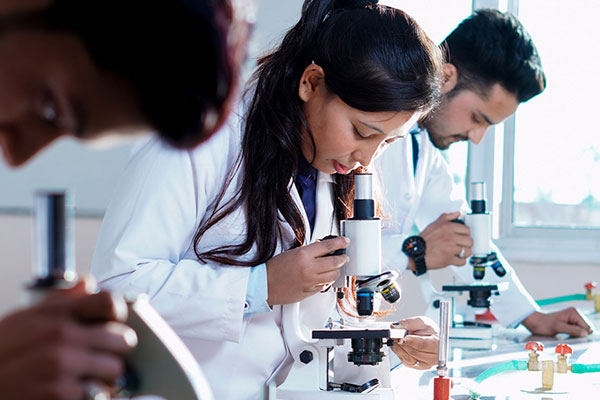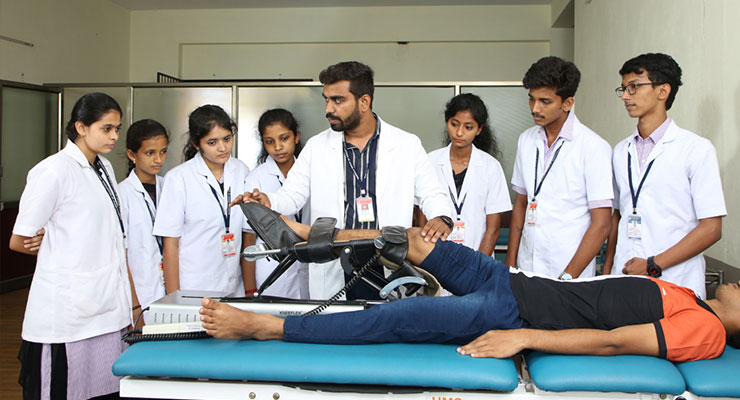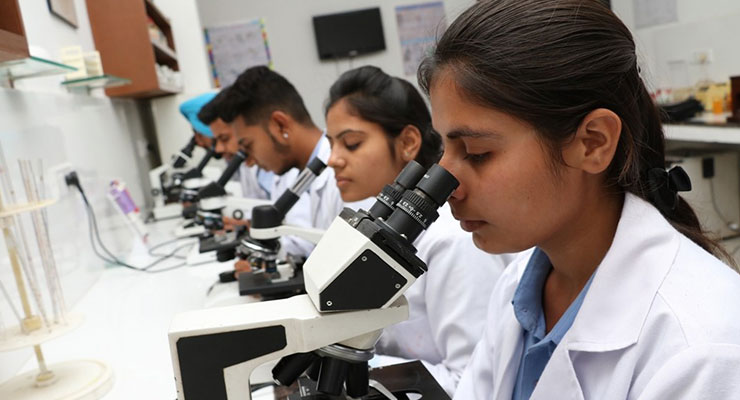
D.Pharmacy (Allopathy)
Diploma in Pharmacy Holds a Bright Future for Students
If you have good aptitude and interpersonal skills and have a desire to help others you can choose Pharmacy as your career. Pharmacists are vital for the primary health care system all around the world. The minimum requirement to become a registered pharmacist in India is Diploma in pharmacy (D.Pharma).
D. Pharma is a practical driven course which is designed to teach the candidates all the basic concepts of pharmaceutical science like:
- Safe and accurate processing of prescriptions
- Dispensing and compounding of medicines
- Accurate record keeping as required under Food and Drug Act
- Purchasing ,Merchandising and Inventory control
- Third party Billing
- Drug approval processes
- Narcotics control
- Pharmaceutical Jurisprudence(laws regulating the profession of pharmacy)
- Regulatory requirements involving testing, screening and clinical trials of drugs
- Computer processing
There are many opportunities after completion of D.Pharma.
- You can get job at drug stores of private or government hospitals.
- You can work in health clinics, NGOs, community health centres by checking the prescriptions, dispensing medicines and give them advice and directions.
- You may get entry level jobs in pharmaceutical companies at various divisions like Process Control, Manufacturing and Quality Control.
- You can also work as Medical Representative.
- If you have entrepreneurial spirit, you can open your own retail pharmacy outlet, wholesale business or surgical items shop.
- Generally, Initial salary in jobs after completing D.Pharma ranges from 8-20k per month but a lot also depends upon your merit, interpersonal skills, profile of the employer, your job profile and job location.
To further enhance your chances of success you can pursue further studies:
- If you have found your passion in pharmaceutical studies, you can go for bachelor’s degree in pharmacy.
- In case you have already done D.Pharma you can directly apply for 2nd year of B.Pharma. Thereafter, you can also pursue postgraduate degrees.
- Another interesting future for your career can be degree in Law after D.Pharma.
- Many pharmaceutical companies hire Litigation and IPR (Intellectual property) lawyers.

B.Pharmacy
Empowering Tomorrow's Pharmacists: Explore the World of B.Pharmacy Today!
A Bachelor of Pharmacy (B.Pharmacy) study is a thorough curriculum created to provide students the know-how, abilities, and proficiency needed for a prosperous career in the pharmaceutical sector. A comprehensive range of topics in pharmaceutical sciences, pharmacology, medicinal chemistry, drug delivery systems, pharmacotherapy, and other related fields are covered in this four-year undergraduate program.
Students study the foundational ideas of pharmacy practice, pharmaceutical analysis, medication development, quality control, and regulatory affairs throughout the B.Pharmacy degree. Students receive practical training in lab environments where they learn how to formulate medications, test pharmaceuticals, and carry out research studies under the supervision of knowledgeable academic members and business experts.
Modules on pharmacokinetics, pharmacodynamics, clinical pharmacy, pharmacogenomics, and drug interactions are also included in the curriculum to provide students a thorough grasp of how medications affect patient health and interact with the body.
All things considered, the B.Pharmacy program provides a thorough foundation in pharmacy education, enabling graduates to meaningfully contribute to the dynamic and ever-evolving area of pharmaceutical sciences and pharmacy.

Bachelor of Physiotherapy (BPT)
The science and practice of physical therapy are the main topics of the undergraduate Bachelor of Physiotherapy (BPT) curriculum. This extensive four-year program culminates in a required six- to one-year internship that equips students with both theoretical understanding and real-world experience. Along with more specialist areas like orthopedics, neurology, and cardio-respiratory physiotherapy, the curriculum covers fundamental courses including anatomy, physiology, exercise therapy, and electrotherapy. This combination guarantees that graduates will be proficient in evaluating, diagnosing, and treating a wide range of physical disabilities and impairments.
Those who complete the Bachelor of Physiotherapy program can pursue a variety of careers. They can work in private clinics, community health centers, sports facilities, hospitals, and rehabilitation institutes. Because of the aging population, greater emphasis on preventative treatment, and increased awareness of physical health, there is a strong demand for physiotherapists worldwide. To further improve their knowledge and employment opportunities, those interested in postgraduate studies can go toward a Master of Physiotherapy (MPT) or other specialty qualifications. All things considered, physiotherapy degrees provide a fulfilling professional path that is centered on enhancing patients' quality of life via physical rehabilitation and wellbeing.

Bachelor Of Science In Medical Laboratory Science (B.Sc. MLS)
A comprehensive undergraduate curriculum, the Bachelor of Science in Medical Laboratory Science (B.Sc. MLS) prepares students for a critical position in the healthcare business. This three-year program combines demanding academic coursework with hands-on instruction in laboratory procedures and techniques. Students gain expertise in a variety of fields, including clinical chemistry, hematology, microbiology, immunology, and molecular biology, while performing intricate diagnostic procedures on patient samples. This curriculum's diversity guarantees that graduates will be prepared to make valuable contributions to the precise diagnosis, treatment, and prevention of illnesses.
The B.Sc. MLS curriculum places a strong emphasis on practical experience. During long laboratory sessions and clinical rotations, students learn how to use cutting-edge diagnostic tools and procedures with ease. Gaining the skills required to correctly assess test data and uphold strict standards for laboratory safety and quality control requires these hands-on experiences. Furthermore, students acquire critical thinking, problem-solving, and effective communication skills—all of which are necessary for collaboration in interdisciplinary healthcare teams.



